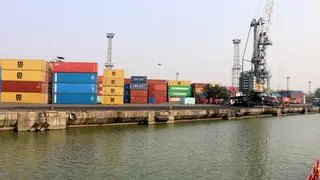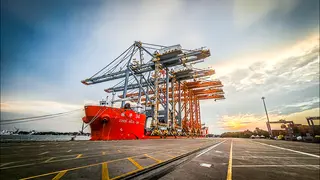Big gets bigger — that’s the story of Adani Ports and Special Economic Zone Ltd (APSEZ), India’s largest private port operator, as it continues its dominance all the way from Mundra in Gujarat on the west coast to Kolkata in West Bengal on the east coast. It controls nearly 28 per cent of the country’s port volumes, with presence in all the maritime states.
To illustrate, in 2022-23, Indian ports handled 1,433 million tonnes (mt) of cargo — major ports, controlled by the Centre, handled 783 mt and non-major ports, under state governments and private companies, handled 650 mt. APSEZ alone handled 339 mt.
The private giant now targets one billion tonnes by 2030, while aiming to become the world’s largest port company, CEO Karan Adani says in its annual report for 2022-23.
After APSEZ’s annual installed capacity of over 550 mt, the next largest private port player is JSW Infrastructure at a distant 170 mt.
Over the past 25 years, APSEZ has consolidated its business mainly through acquisitions, with the recent being Gopalpur port in Odisha.
End-to-end logistics
Starting off by servicing a vessel at Mundra port on October 7, 1998, the Gujarat company has grown exponentially into an end-to-end logistics solutions provider — from port gate to customer gate.
Also read: Gopalpur port buy will give Adani group bigger hold over east coast logistics
Along the way, it transformed India’s port sector, which was hitherto characterised by a single company owning a port and farming out services to vendors. APSEZ was selected to provide an integrated solution as a holistic port-cum-logistics service provider.
Mundra port remains the company’s crown jewel, even as it lapped up many more countrywide, along the east and west coasts, giving it coverage over the entire 7,500 km of India’s coastline.
Gopalpur port will add 20 mt handling capacity. The Odisha government had earlier awarded a 30-year concession to Gopalpur Port Ltd in 2006, with provision for two 10-year extensions. As a deep-draft, multi-cargo port, Gopalpur handles a diverse mix of dry bulk cargo, including iron ore, coal, limestone, ilmenite, and alumina.
Maritime power
Besides acquisitions, APSEZ’s portfolio of ports includes greenfield development, too, says Jagannarayan Padmanabhan, Senior Director and Global Head of Transport, Logistics and Mobility, CRISIL.
Also read: Adani Ports-Gopalpur Port acquisition: A step closer in achieving East-West parity
The export-import logistics market has evolved from servicing through standalone assets to owning the entire value chain of customer service. Towards this end, APSEZ has established presence in all the key maritime states on the east and west coasts, he adds.
On the scope for more acquisitions, Padmanabhan says APSEZ still has room for growth in states like West Bengal and Karnataka, given that more than 150 terminals at major ports are likely to be privatised.
The Maritime India Vision 2030 envisages creating supply-driven maritime infrastructure to help India achieve a $5-trillion economy by 2027.
Ennarasu Karunesan, global maritime, port and logistics expert, says the Adani group has matched its port operations to global standards.
On fears of looming monopoly with so many ports and terminals under a single company, Karunesan likens it to the situation in the airline sector, where Indigo holds 60 per cent market share. With time and cost being the crucial factors in logistics, cargo will flow to any port that best meets these requirements, irrespective of ownership, he says.











Comments
Comments have to be in English, and in full sentences. They cannot be abusive or personal. Please abide by our community guidelines for posting your comments.
We have migrated to a new commenting platform. If you are already a registered user of TheHindu Businessline and logged in, you may continue to engage with our articles. If you do not have an account please register and login to post comments. Users can access their older comments by logging into their accounts on Vuukle.